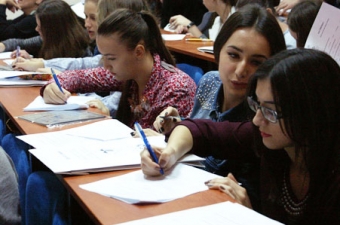Following the presentation about the ICTY held in October, students and teachers of the Combined High School in Srebrenik expressed interest in learning more about the Tribunal’s jurisprudence. As a result, an additional presentation by Almir Alić, ICTY representative in BiH, was organised in their school.
The school hall was packed to capacity for a dynamic two-hour presentation about the Tribunal’s jurisprudence related to genocide, with more than 100 students and their teachers in attendance. Almir informed the audience about the ICTY judgements which had resulted in the first convictions entered by an international criminal tribunal for the crime of genocide committed on European soil. The high-school students from Srebrenik were keen to learn more about the ‘protected groups’ definition and asked if the killing of male members of the group constituted the intent to destroy the group as a whole. The answer to that question was given through an explanation of the first conviction for the Srebrenica Genocide, which was entered in the Krstić case. According to this Judgement, the Bosnian Serb forces knew that the elimination of the adult male population together with the forcible transfer of women, children and elderly, would inevitably result in the physical disappearance of the Bosnian Muslim population in Srebrenica.
After the presentation, Teacher Aida Muminović called for the continuation of this type of cooperation between the Tribunal and high-school students. She stressed that this was particularly important at this time given that the ICTY is nearing its closure and that, following the completion of its mandate, it will be less straightforward to get such valuable, first-hand information about the Tribunal’s work and its judgements.


